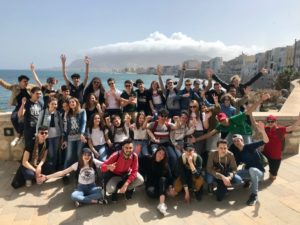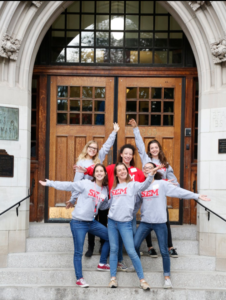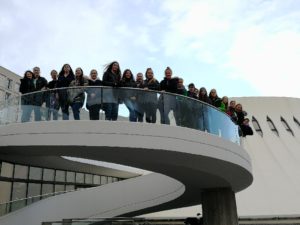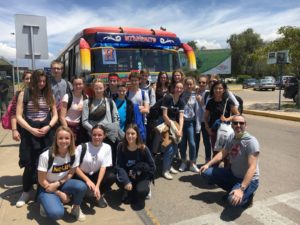
Group trips are mainly school exchanges (which imply reciprocity). They last 1 to 2 weeks. Groups are composed of 20 to 30 students on average and are generally supervised by 2 adults from St Jo. Accommodation is with families. On-site activities are divided between lessons at school and visits.

Individual mobility lasts on average 2 months, with students (2 to 5 in general) travelling unaccompanied. Accommodation is most of time with a family. Some of these mobilities are exchanges (which implies a reciprocity of welcome).
Throughout the school year we are looking for host families for durations ranging from one week to one term or more.

We may need families to host exchange students when the number of participants is higher with our partners, when the boy/girl distribution is too unbalanced between the exchange groups, when families are totally unable to host, during the organisation of the international summit. If you wish to help us to welcome young foreign students attending school at Saint Jo, please contact Mrs Clément by email (international@st-jo.fr).
The Saint Joseph Institution has been involved in European projects since 1998 (Comenius then Erasmus+) with more than 15 partners throughout Europe.
The Erasmus+ programme makes it possible to finance a wide variety of projects. It aims at:
Erasmus Charter
The school holds the Erasmus charter for Saint Jo Sup students since 2022.
The ROR project: Routes to our Roots 2020-2022 postponed 2021-2023
6 partners: France, Sicily, England (Cantell), Netherlands, Belgium and Turkey
Total grant: 143,205 euros of which 33,376 euros for Saint Jo
Duration of the project: 2 years
European priorities:
Themes addressed by the project:
32 planned activities: school exchanges, individual mobility, job shadowing, teacher meetings, etc.
Project imprints with all partners:
Discovering our European countries today and to developing relations between the communities of the different schools.
How to preserve a trace and exhibit a trip in 2022?
How are digital technologies transforming our relationship to others and to our spaces?
So far and now so close thanks to Google Earth, social networks…
From the start of the project in September 2020 :
The journey and the encounter begins:
Cultural and historical exchange in a foreign language with the Netherlands and England
Summary of the project:
In a world where the current geopolitical developments of the superpowers and other influential countries are at odds with the common values on which the European project was built, it is important that we increase our efforts to celebrate and strengthen the ideals and values that reflect our community. Through a range of activities between different educational institutions in the EU and beyond, we will explore and celebrate our common cultural and natural history. We will discover the routes to our roots. There are 6 participating educational institutions from 6 countries. The project will directly involve 2000 pupils and 50 staff members from the educational community. The activities are diverse and range from the study of biodiversity to the development of multilingualism. Many students will visit other countries as part of the exchange programme and discover other countries and cultures through direct experiences.
These students are our future leaders. Understanding our common history and humanity is fundamental to the European project. This programme will study our common cultural and natural histories and show how we are more connected than different. These experiences can only benefit us all in the future.
The POWO project: Act for a positive world, took place between 2016 and 2019.
7 partners: France, Spain Calafell, Great Britain Brighton, Sweden Stockholm, Italy Borgo San Lorenzo and Trapani, Belgium Brussels
Summary of the project:
This project is in line with the climate conference held in Paris in December 2015 which is a priority for Europe, the French government and the Ministry of Education.
The objectives are complementary to the pedagogical objectives set in the European school curricula. It is necessary to explain the energy transition and the transformation of our economy towards a sustainable and positive economy for European children to be the protagonists of this indispensable evolution. They should not be afraid of the new world that awaits them and need to adapt to a global world.
The participants in the project are all educational communities (pupils, families, teachers…) and their social relations through educational associations (sports, scouting, extra-curricular activities).
The aim of the work is to get young people involved in activities and experiences, before they can translate these into words and images in order to theorise and communicate.
The methodology of the experience: the journey, the meeting and the realisation are often very relevant for the student.
The human and concrete aspect of their experiments will make them experience something they cannot forget and will awaken an awareness of their place in tomorrow’s world for them to become active and responsible world citizens.
Objectives:
Methodology :
The planned mobilities will therefore be an integral part of the planned exchanges of good practice, they will enable the pooling and implementation of interdisciplinary and inter-country work.
51 concrete actions and mobilities planned over the 3 years.
Links on the websites of the partner schools

Stay in Bolivia
Different actions to help Madagascar in partnership with ASFM
Competition: What do you know about Europe?
This competition is aimed at all pupils in Primary schools, as well as all general, technological and vocational Middle and High schools, who compete against each other in each of the four different categories: everyday life, culture, European institutions and economics.
Its aim is to raise pupils’ awareness of the European reality, especially Europe Day, on May 9th. It also intends to promote the use of common information and communication technologies in education. The skills used by pupils can be assessed by teachers via the Internet and Computer Science Brevet examination.
This scheme therefore has a strong educational dimension and is based on the curricula for teaching subjects, particularly moral and civic education, as well as on educational pathways.
El Campeonato Competition
El Campeonato is an educational and fun competition aimed at all French secondary school students, Grades 6 to 12, who wish to test their knowledge while discovering Hispanic culture and the Spanish language.
Africa 2020 2021 Season: “Franco-Senegalese Footprints” in partnership with Sainte Jeanne d’Arc Institution in Dakar
This project invites the educational teams to get involved in the Africa 2020 season by proposing the production of educational supports (books, digital supports, physical or virtual exhibitions, artistic installations, etc.) created by the students in a multidisciplinary approach. The project will be co-constructed with one or more partners from Africa or the African Diaspora (associations, intellectuals, artists, scientists). Partnerships with classes on the African continent will be valued.
Theme for secondary education: “New cross view(s) on Africa”.
This pedagogical project is multidisciplinary, pan-African and open to major contemporary issues: circulation of goods and people, entrepreneurship and innovation, sports, ecology and biodiversity, gender equality, etc.
It will take place in the first half of 2021.